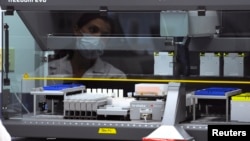The facility, which is being supported by the United States and Ireland, will enhance investigations of sexual and gender violence.
Speaking at the official opening, Zambia’s Home Affairs and Internal Security Minister Jack Mwimmbu expressed his happiness with the new facility.
"This laboratory will play a very important role in our criminal justice system," he told attendees. "Sexual and gender violence crimes like rape and defilement will potentially be resolved using modern validated scientific methods."
U.S. ambassador to Zambia Michael Gonzales said the launch of the laboratory is an important milestone in the nation’s efforts to hold perpetrators accountable under local law.
He also said preventing and responding to all forms of sexual and gender-based violence is a cornerstone of the U.S. government’s commitment to promoting democracy, advancing human rights, and furthering gender equity and equality.
Gonzales added that the DNA forensics laboratory, staffed with highly trained technicians, has the ability to process tens of thousands of forensic submissions each year.
Zambia reports more than 20,000 gender and sexual violence cases – most of which concern girls, babies and women – but a lack of scientific evidence allows most perpetrators to go free.
Inspector General of Police Graphel Musamba told the press that there was a 63% increase in gender-based violence between 2021 and 2022.
The U.S. embassy reports that the number of cases more than doubled over the past two years in Zambia: nearly 9,000 cases were reported between July and Sept 2022, compared to only 4,000 over the same period of 2021.
Perpetrators face up to 15 years in prison if found guilty in Zambian courts of law, and human rights groups hope DNA or deoxyribonucleic acid testing will ensure that they are brought to justice.







